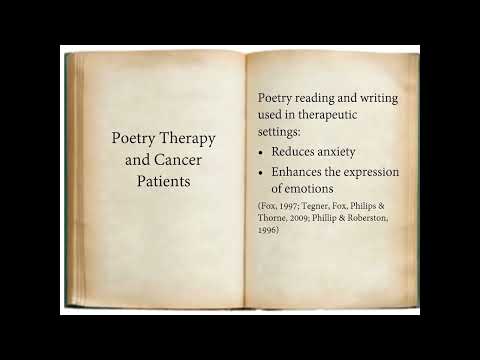 Speaker: David I. Hanauer @DHanauer
Speaker: David I. Hanauer @DHanauer
 Affiliation: Indiana University of Pennsylvania & University of Pittsburgh
Affiliation: Indiana University of Pennsylvania & University of Pittsburgh
Title: Poetic Autopathography: Writing through Cancer
Abstract (long version below): This presentation explicates the theoretical positions on poetic autopathography writing for well-being during serious illness and exemplifies the ways in which poetry and art journaling can provide psychological support during cancer treatment and in the aftermath of living with an advanced cancer diagnosis.

 Long abstract
Long abstract
Autopathography is a genre in which a writer explores, explicates and tries to understand their own illness (Aronson, 2000; Couser, 2012; Lorde, 1980). Patient’s writing explaining their perceptions and experiences while going through illness has a long history dating back to the origins of the medical case history in the 1850s and has been used for multiple types of chronic disease including cancer, neurological disorders, psychiatric conditions and cardiovascular disease (Aronson, 2000). Recent developments in autoethnographic research and writing for well-being provide a context for understanding how this type of writing may function and ways in which it may provide needed psychological relief for patients suffering with a chronic life-threatening disease (Hanauer, 2022).
Autopathography has primarily used autobiographical narrative writing to explicate a description of living through illness. The current study exemplifies and explicates the theoretical underpinnings of a poetic autopathography. Building upon the emergent research into self discovery in autoethnographic poetry writing, the current study utilized the writing protocol of Hanauer (2010, 2021 2022) to explore the researchers own experiences of an advanced cancer diagnosis, radiation treatment and longer term living with a terminal cancer diagnosis. The study consists of two years of data from the point of initial diagnosis utilizing three different poetic and artistic journaling techniques: daily freewriting, daily poetic image writing and poetic-art journaling. The journals were analyzed for their insights into the experiences of living through advanced cancer as well as the ways in which poetic autopathography can offer psychological support for cancer patients.
Analysis of the trajectory of the journals shows a movement from panic to acceptance and a search for ways in which changes in conceptual understanding, belief and emotional connectivity can provide relief for the stresses of living with cancer. From the perspective of writing for well-being, the various journal techniques function in different ways with daily freewriting providing insight and clarity concerning everyday concerns, poetic image writing providing an emotive connection to significant events and poetic-art-journaling providing in depth expression and artistic transitioning of difficult personal experiences. Overall, poetic autopathography provides the option of the what Nietzsche has termed the aesthetic justification of life in which the grimmest of lived experiences can be transformed into an art work that is of value to the writer, to those who that writer loves and appreciates and for all those who may be going through similar experiences. During the presentation the journal data will be shared with audience members.
References
Aronson, J. K (2000). Autopathography: the patient’s tale. BMJ, 321(7276), 1599–1602.
Couser, G. T. (2012). Autopathography: Women, Illness, and Lifewriting. In M. Jolly (Ed.), Encyclopedia of Life Writing: Autobiographical and Biographical Forms (pp. 82-84). Routledge
Hanauer, D. (2010). Poetry as Research: Exploring Second Language Poetry Writing. Amsterdam: John Benjamins.
Hanauer, D. (2021). Poetic writing research: the history, methods, and outcomes of poetic (auto) ethnography. In D. Kuiken and A. Jacobs (Eds. Handbook of Empirical Literary Studies pp.412-448. Berlin; Boston, MA: De Gruyter.
Hanauer, D. (2022). The writing processes underpinning wellbeing: Insight and emotional clarity in poetic autoethnography and freewriting. Frontiers in Communication.
Lorde, A. (1980). The cancer journals. Spinsters Ink.

